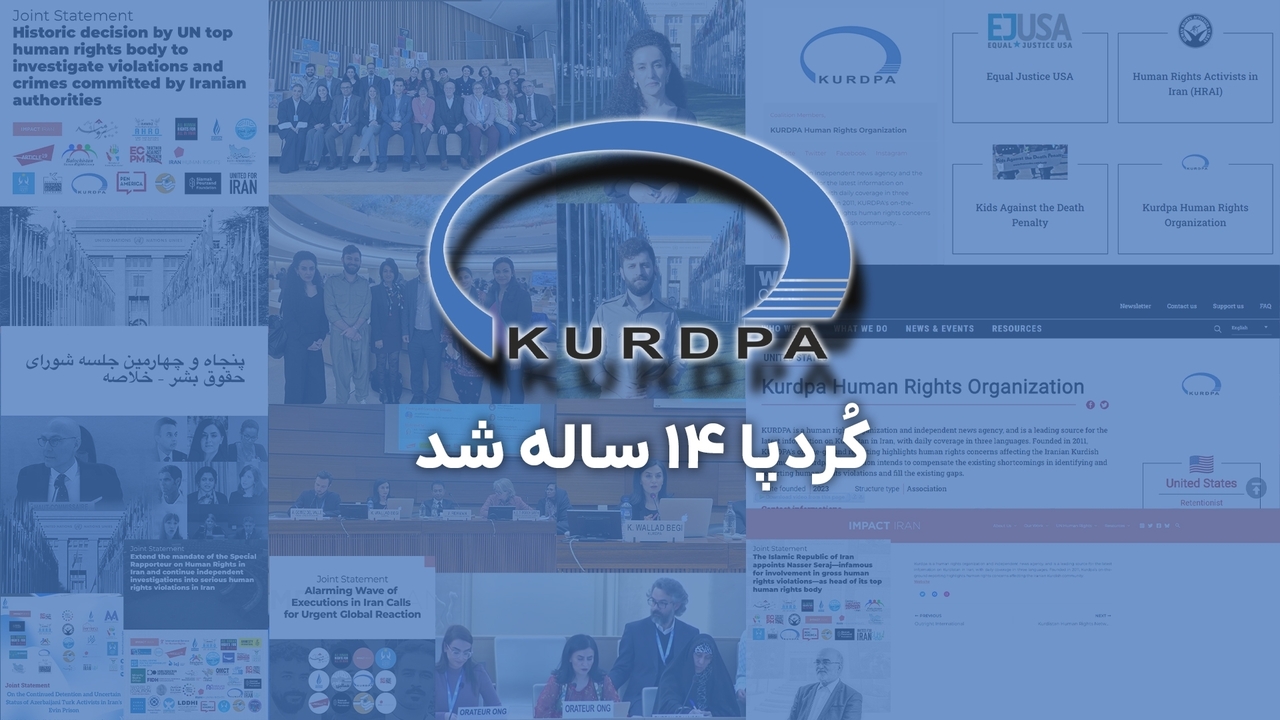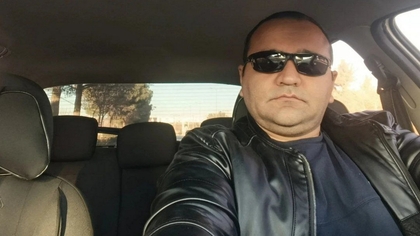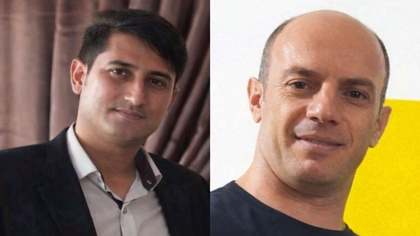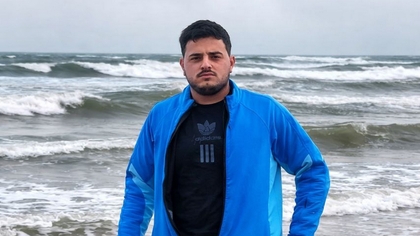Kurdpa Turns 14: Fourteen Years of Responsibility, Documentation, and Promotion of Human Rights for the People of Kurdistan

Fourteen years ago, on July 23, 2011, after nearly a year of planning, preparation, and continuous behind-the-scenes efforts, “Kurdpa – Kurdistan News Agency” officially began its activities as the first specialized, human rights-focused media outlet outside Iran; a media outlet that, with a consistent, ongoing, and multilingual approach (Kurdish, Persian, and English), has documented and reported daily on human rights violations in Iranian Kurdistan and has continued this mission without interruption to this day.
Prior to Kurdpa, in 2005, Mohammad Sadiq Kaboudvand, through the establishment of the “Kurdistan Human Rights Organization,” founded the first structured institution inside Iran for documenting human rights violations in Kurdistan. However, with his arrest and sentencing in July 2007 to ten and a half years in prison, that organization’s activities were halted, creating a void in the documentation and defense of the rights of the people of Kurdistan. Kurdpa, operating outside Iran, assumed this responsibility and quickly became the primary source for data, field reports, and documented accounts from Kurdistan.
Over the past fourteen years, Kurdpa has:
- Documented thousands of cases of arrests, executions, killings of kolbars (cross-border porters), structural discrimination, violations of women’s rights, labor crises, suicides, and environmental disasters, publishing them in the form of statistical reports and analytical dossiers;
- Established a new standard for human rights reporting in Kurdistan, based on multi-layered fact-checking, precision in detail, avoidance of distortion, and respect for data ownership;
- Through official participation in United Nations mechanisms (oral statements at the Human Rights Council, UPR and CERD reports, and correspondence with Special Rapporteurs) and cooperation with international organizations (including Amnesty International, the Fact-Finding Committee, and Human Rights Watch), brought the voices of Kurdistan’s victims to the global stage;
- Participated in over 40 official or joint statements on executions, women’s rights, minorities, environmental crises, political assassinations, and the right to self-determination, solidifying its role as a promoter and standard-setter for human rights;
- By joining the Impact Iran coalition and the World Coalition Against the Death Penalty, and through its official registration as a human rights organization in the United States (2020) and Canada (2024), strengthened its legal and network presence at the international level.
Today, Kurdpa is not only a trusted source of data and field reports from Kurdistan but also a practical model for transparency, accuracy, advocacy, and the connection between human rights documentation and civic activism. Fourteen years of voluntary and uninterrupted work have demonstrated that the voice of Kurdistan, even under the pressures of censorship, filtering, and security labeling, remains alive, is heard, and Kurdpa is determined to keep this voice alive and lasting beyond borders, in the service of justice for victims.
Part One – From Kurdistan News Agency (Kurdpa) to Its Registration as a Human Rights Organization
Kurdpa officially began its activities on July 23, 2011, as a news agency under the name “Kurdpa News Agency,” to fill the existing information gap by professionally and impartially covering human rights violations in Iranian Kurdistan, and to convey the news with accuracy and reliability to the media, public opinion, and international organizations. From the outset, this mission was founded on the ethical and professional principles of journalism: multi-source fact-checking, political neutrality, respect for human dignity, and avoidance of publishing any news or analysis lacking documented evidence in all reports.
Kurdpa emerged at a historical moment when social networks were not yet widespread and access to news from Kurdistan was difficult for the public and the media. In such circumstances, where reporting on human rights violations in Kurdistan was scattered and incomplete, Kurdpa was established to fill this void and to ensure regular and comprehensive coverage of these cases at both domestic and international levels. Before Kurdpa began its work, reports of human rights violations in Kurdistan were mostly dispersed and lacked statistical structure. Kurdpa changed this trend and created an organized and categorized model for documentation. Before Kurdpa’s launch, data and reports on human rights violations in Kurdistan were scattered, unsystematic, and often lost among political reporting. Kurdpa broke this pattern and established a cohesive and professional structure for the consistent and transparent coverage of such cases. The key features of this new model included:
- Creation of a comprehensive and organized archive: Accurate recording and categorization of cases of human rights violations (ranging from executions and killings of kolbars to structural discrimination, labor crises, suicides, and environmental disasters) in the form of statistical reports.
- Standardization of documentation: Establishing a culture of statistical categorization, multi-layered fact-checking, and avoidance of distortion in reports, which has now become a benchmark for many other human rights organizations in Kurdistan.
- A multilingual and cross-border media platform: Using three languages (Kurdish, Persian, and English) and relying on a network of local and cross-border reporters and sources, to ensure that the data is usable both for the local public and for media and international organizations.
- Linking reporting with advocacy: Transforming documented data into legal and civic tools to support victims, attract global attention, and exert pressure on structures perpetrating human rights violations.
This approach enabled Kurdpa to become not only the main news reference on human rights violations in Iranian Kurdistan but also a model for transparency, accuracy, and the connection between reporting and activism—a position it has maintained for 14 years.
With the expansion and intensification of systematic and institutionalized human rights violations in Iranian Kurdistan—from mass executions and the killings of kolbars to the suppression of protests, structural discrimination, and economic and cultural deprivations—the need for an independent and professional body capable of continuously identifying, recording, and transmitting these cases to international mechanisms became increasingly urgent. In response to this need, Kurdpa, which had begun its mission as the first specialized media outlet outside Iran since 2011, was officially registered as a nonprofit and human rights organization in the United States on April 7, 2020, and subsequently in Canada on March 28, 2024. This legal and structural expansion pursues two key objectives:
- Imposing costs on human rights violations in Iranian Kurdistan through meticulous documentation and providing data to international institutions, so that cases of arrests, executions, crackdowns, and structural discrimination are recorded in official United Nations documents and global human rights reports, placing those responsible for such violations under international scrutiny and pressure.
- Advocacy and impact in the field of human rights; with the aim of raising public awareness, empowering activists, amplifying the voice of the people of Kurdistan—as a minority subjected to oppression and compounded suppression—to global public opinion, and actively engaging with formal human rights mechanisms to pursue accountability and justice at international levels.
Relying on a broad network of reporters, field sources, and volunteers across Kurdistan, the Kurdpa team not only records events but also transforms this data into effective tools for advocacy, lobbying, and civic education; tools that are today reflected in reports of the United Nations Human Rights Council, UPR, CERD, Amnesty International, Human Rights Watch, and dozens of international bodies.
Kurdpa continues along this path by upholding four fundamental principles:
- Full independence and avoidance of politicization,
- Commitment to a strictly human rights-focused and education-oriented approach,
- Multi-source fact-checking and dual verification for each report,
- Expansion of its network of volunteers and observers to ensure comprehensive coverage without geographical limitations.
This structure and these principles have made Kurdpa a trusted and effective reference, recognized as a credible and responsible human rights organization whose data has gained international authority and is reflected in United Nations reports, human rights institutions, and global media. At the same time, it functions as a documenter, defender, and promoter of human rights in Kurdistan; an institution that not only conveys the voices of victims to the world but also makes human rights violations costly and undeniable for perpetrators and structures of repression.
Part Two – The International and Advocacy Role of the Kurdpa Human Rights Organization
Over the past fourteen years, Kurdpa has not limited its activities to recording and publishing news, reports, and data, but by expanding its presence within international networks and coalitions, formal United Nations mechanisms, and issuing joint statements, it has succeeded in bringing the voice of human rights violations in Kurdistan to the global stage and transforming its field data into tools for diplomatic pressure and human rights activism.
This international role has been pursued along three main axes:
2.1 – Membership in International Coalitions and Networks
- Impact Iran Coalition (June 2022): Cooperation with over 17 non-governmental organizations to provide data and thematic reports to the Human Rights Council, the Committee on the Elimination of Racial Discrimination (CERD), and the UPR process, with a particular focus on the rights of minorities and victims of repression in Kurdistan.
- World Coalition Against the Death Penalty (October 2023): Joining more than 160 human rights organizations, bar associations, and unions to advance the global abolition of the death penalty and reduce its use in countries such as Iran.
These memberships have integrated Kurdpa into international networks that connect its field documentation to policy-making and global pressure.
2.2 – Presence in United Nations Mechanisms and Formal Diplomacy
- Human Rights Council (HRC): Delivered at least three official oral statements (2019 to 2023) on executions, the killings of kolbars, and the suppression of the Jin, Jiyan, Azadi revolutionary uprising; including the address by Dr. Kocher Valadbeygi at the 52nd Session (March 2023) in Kurdish attire, which was met with harassment by diplomats affiliated with Iran in the hall, prompting an official Kurdpa response.
- Periodic United Nations Reports: Kurdpa’s statistical and field data were incorporated into the joint “Minority Rights” report for Iran’s fourth UPR cycle (January 2025) and the 30-page CERD report (July 2024); these data formed the basis of nine key recommendations in the draft United Nations reports.
- Correspondence and Collective Action: Participation in a warning letter by 55 organizations to four Special Rapporteurs concerning the internet restriction bill (October 2021) and a joint statement by 15 entities on women’s reproductive rights (May 2024).
- Field Diplomacy: Annual meetings of Kurdpa representatives with diplomats and supporting organizations on the sidelines of Geneva sessions, including negotiations with German and Dutch delegations in July 2023 regarding the killings of kolbars; as well as Kurdpa’s formal presence in March 2025 following the presentation of the United Nations Fact-Finding Committee’s second report at the UN public session.
These initiatives have transferred Kurdpa’s data into official records and international human rights policymaking, conveying the voices of Kurdistan’s victims to global decision-making bodies.
2.3 – Statements and Networked Advocacy
Between July 2011 and July 2025, at least 40 official or co-signed statements have been issued in the areas of executions and enforced disappearances, women’s rights, minority rights, environmental crises, political assassinations, the right to self-determination, and symbolic occasions.
These statements have made Kurdpa the most statement-driven Kurdish human rights entity in Iran and elevated its position from a mere media outlet to a spokesperson for Kurdistan’s civil society.
Kurdpa’s model of networked collaboration with dozens of local and international organizations has strengthened collective advocacy for justice and accountability, transforming the organization’s field data into a source of reference and legal pressure for the media, lawyers, and international institutions.
Part Three – Kurdpa’s Reporting Style: Precise Documentation, Avoidance of Distortion, and International Credibility
Over the past fourteen years, Kurdpa has transformed human rights reporting in Iranian Kurdistan from the scattered publication of news and statistics into a professional and coherent documentation process; a process that both adheres to international human rights standards and provides reliable data for accountability, research, and diplomatic pressure.
Kurdpa has not limited itself to publishing statistical bulletins but has also prepared comprehensive analytical dossiers on issues such as arrests, state killings and executions, the killings of kolbars, the repression of women, judicial discrimination, labor crises, environmental disasters, and even lesser-noticed phenomena such as the suicides of Kurdish soldiers. All these reports are supported by disaggregated data, legal analyses, and field evidence.
Two core principles form the foundation of this reporting method:
Multi-layered fact-checking and avoidance of distortion:
- Every news item or report, prior to publication, is cross-checked with at least two field witnesses and, where possible, the opinion of a lawyer or informed activist.
- Kurdpa explicitly states that, due to the security environment, it may not cover all cases of human rights violations, but it never provides estimated or undocumented figures, prioritizing accuracy and credibility over speed.
- This approach has enabled Kurdpa to avoid the security traps set by repressive institutions designed to discredit media and human rights organizations.
Respect for collaboration and data ownership:
- Kurdpa recognizes the efforts of other organizations, uses their data with source attribution, and avoids copying or omitting the names of sources.
- This transparency, while preserving credibility, has made Kurdpa a trusted partner rather than a competitor for civil and human rights organizations.
Through this method, Kurdpa has now become the professional benchmark for reporting in Kurdistan:
- Its data and analyses form the backbone of reports by Impact Iran, the Committee on the Elimination of Racial Discrimination (CERD), and the UPR, and have underpinned nine official recommendations to the Iranian government at the United Nations.
- Kurdpa’s statistics and documentation on kolbars and executions have been acknowledged in Human Rights Council sessions and even introduced the term “kolbar” into the United Nations diplomatic lexicon.
- Global entities including Amnesty International, Human Rights Watch, and international digital rights foundations reference Kurdpa’s data to substantiate field realities in Kurdistan.
Through this approach, Kurdpa has demonstrated that it never sacrifices accuracy and credibility for speed or media competition, and this has allowed its data not only to amplify the voices of victims but also to become genuine tools for justice, accountability, and pressure on structures of repression.
Part Four – The Perspective and Sensitivity of the Islamic Republic Toward Kurdpa
From its earliest months of operation, Kurdpa has been the target of systematic restrictions and pressure by the Islamic Republic. Only six months after its official launch, in February 2011 (Bahman 1389), the Kurdpa website was filtered by order of the Committee for Determining Instances of Criminal Content, and since then, all substitute domains of this media outlet have been blocked in Iran.
Kurdpa’s name has also repeatedly appeared in state media and official government documents, primarily for the purpose of security labeling:
- In 2023, the IRNA news agency (English edition), in a report, listed Kurdpa along with several other civil organizations as part of “Anti-Iran groups,” describing their motive as “efforts to divide Iran.”
- In the winter of 2021 (1399), National Security Quarterly, affiliated with the Supreme National Defense University, classified the address www.kurdpa.net among the sources of “ethnic extremist currents and soft threats” in a research article.
Security sensitivities toward Kurdpa peaked following the Jin, Jiyan, Azadi revolutionary uprising. At 13:21 on September 15, 2022 (24 Shahrivar 1401), this media outlet published the first image of Jina/Mahsa Amini unconscious at Kasra Hospital in Tehran. This publication, coinciding with the start of nationwide protests, resulted in Kurdpa being labeled in state and security media as one of the “hostile Kurdish media outlets.”
Furthermore, family members of Kurdpa team members in Iran have faced multiple instances of security pressure, including:
- Repeated arrests and summonses,
- Social and educational deprivations,
- Direct threats regarding the forced return of members residing abroad.
Kurdpa has refrained from publicly reporting on these matters, as the family members under pressure in Iran have no political or human rights activities and are merely ordinary citizens; the primary aim has been to prevent further harm to them.
Thus, while Kurdpa’s name appears infrequently but consistently in the Islamic Republic’s official documents, always within a framework of criminalization and delegitimization, the use of Kurdpa’s data and resources by security research centers in analytical articles (such as those of the Supreme National Defense University) demonstrates that Kurdpa’s data, even within the regime’s security discourse, serves as a field source for government institutions.
Final Section – Kurdpa’s Commitment, Gratitude, and Continuing Path
After fourteen years of continuous activity, which began on July 23, 2011, with the fewest resources and based on voluntary efforts, Kurdpa still considers itself to belong to the people of Kurdistan, not to any specific individual or group. From day one, this institution has adhered to the principle that the people of Kurdistan have the right for their voices, their experiences of oppression and compounded discrimination, and the realities of their lives to be heard on a broad scale.
The Kurdpa team sees it as its duty, for as long as it remains active in this field, to uphold all its principles and commitments:
- Amplifying the voice of Kurdistan and conveying it to global public opinion,
- Shouting against the discrimination and compounded rights violations faced by the people of this region,
- And continuing documentation and pursuit of justice, in full compliance with professional standards and universal principles of human rights.
Over these fourteen years, alongside the recording and publication of data, we have consistently sent our reports to the United Nations Special Rapporteur on Human Rights in Iran and have cooperated with organizations such as Amnesty International, Human Rights Watch, and other reputable institutions. During the recent nationwide protests, our extensive collaboration with the United Nations Fact-Finding Committee was part of our effort to ensure precise and international documentation.
Along this journey, we express our gratitude to all Kurdish and non-Kurdish media, television networks, and news platforms that, through their trust and coverage, have helped sustain Kurdpa’s work; to all audiences and activists who have stood with us over these years; and to the international media that, through their trust, have brought Kurdpa’s data to the global stage. This trust has been one of Kurdpa’s greatest achievements in amplifying the voice of Kurdistan.
Today, in remembrance of all those who have lost their lives in the struggle for freedom and those who remain in captivity, Kurdpa pledges to continue this path with the same sense of responsibility and professional principles with which it began, and to become, more than ever, the voice of the voiceless and the defender of the rights of the people of Kurdistan.
Kurdpa Human Rights Organization – Kurdpa Management Council
July 23, 2025 (1 Mordad 1404)



